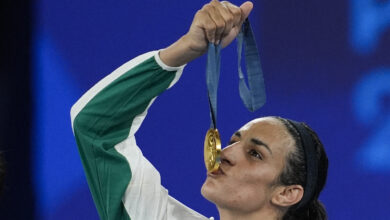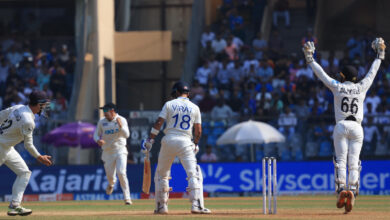Paris Olympics: Vinesh Phogat denied on the cusp of ultimate glory, another entry in her diary of heartbreaks | Sport-others News

Imagine what it must feel like to be Vinesh Phogat today.Wednesday night, under the sparkling Eiffel Tower, was to be her moment of crowning glory. A medal, finally. Gold even, possibly. An Olympic-sized revenge for all those Games that have given her only grief.
Who knew the morning would only bring more torment for a wrestler whose entire sporting career has been a tale of unbearable suffering?
Broken knees and ruptured ligaments didn’t break her spirit. Spending nights on the footpaths of the Capital and being dragged into a van Delhi Police couldn’t stop her. A hundred grams did. The extra weight that disqualified her from competing for the gold medal at the Paris Olympics.
There would be no happy ending to this story. At least for now.
Phogat is one of a kind in Indian sports. ‘Moohfat’ in the Indian sporting universe of meek. She got this courage from her mother, who raised her alone after being widowed at the age of 32. Before she left the Champ-de-Mars arena on Tuesday night, Phogat promised her she’d bring home the gold.
The next morning, she was on the bed of the Athletes’ Village polyclinic, getting intravenous drips. The podium wasn’t her destiny.
Phogat once spoke about how life only keeps throwing curveballs at her. This was while sitting inside a tent on a hot summer afternoon at Jantar Mantar, desperate and helpless that her protests and those of her wrestling mates, Sakshi Malik and Bajrang Punia, were hitting a dead end.
“Par unhe kya pata Vinesh kya cheez hai!” she laughed. “Sab sehen kar lenge. Gir, gir kar seekh gaye hai thoda.” (What do they know who Vinesh is! I’ll tolerate everything. I’ve learnt a lot with every fall.)
Headstrong and impulsive, the 29-year-old has for long been Indian wrestling’s rebel with a cause, a wrestler-philosopher whose career has seen as many lows as highs, and who has endured deep, dark moments off the mat as well as shone under the spotlight on it.
Phogat once spoke about how life only keeps throwing curveballs at her. This was while sitting inside a tent on a hot summer afternoon at Jantar Mantar. (PTI/File)
Ask any athlete and they will be prompt to say that the Olympics are the ultimate highlights of their careers. For Phogat, however, they’ve only been a source of heartbreaks and miseries.
She maintains a diary, which gives a peek into the other side of elite sport. The bit that the HD cameras and flashlights do not always capture. Long periods of training alone, wrestling with one’s doubts, living and competing at places far from glamorous.
In late 2016, after the Rio Olympics, she noted down motivational quotes from self-help books in her diary. In Rio, Phogat twed her knee during a bout and was carried off the mat in tears, with an ambulance waiting for her outside the stadium to carry her to a hospital.
She fought back and returned with vengeance to win the Asian Games gold medal two years later. Three years ago, at the Tokyo Olympics, it was the ‘mental torture’ that jeopardised her campaign.
Trauma after upset
Going into those Games, Phogat was flying high, beating almost every opponent that stood in her way, winning titles, climbing up the rankings and becoming one of the favourites to win a medal in the 53 kg category.
But she lost in the quarterfinals to former world champion Vanesa Kaladzinskaya of Belarus and was subsequently sanctioned the federation for perceived ‘indiscipline’ and was roundly criticised for her performance.
She had no motivation, was tired mentally and decided to give up wrestling. “Imagine how it must feel if it reaches a stage where an athlete wants to stop doing the only thing she has done all her life?” she had told The Indian Express in an interview earlier.
But the fighter in her didn’t throw in the towel. An “inner voice”, Phogat had said, urged her to give it one more shot. The athletes who she routinely defeated finished on the podium in Tokyo. It bruised her ego but also gave her the confidence to return.
Going into those Games, Phogat was flying high, beating almost every opponent that stood in her way, winning titles, climbing up the rankings. (REUTERS)
Two months later, she was back on the mat, mesmerised the aura of the five rings and the unfulfilled dream of an Olympic medal.
For more than a year, she didn’t make a single entry in her diary. “What would I have written?” she had said. “Another sob story?” When she restarted her habit, Phogat found new things to note: her heartbeat while running, sprint timings, the average times of the 400m laps she ran, her speed while attacking, the food she ate, the body weight she maintained.
When it looked like her career was back on track, Phogat chose to pause it and take on a ‘bigger, more important task’- to call out former Wrestling Federation of India president Brij Bhushan Sharan Singh. She led the protests against him with Sakshi and Bajrang, accusing the BJP MP of sexual harassment.
Phogat spent months on the streets of New Delhi, returned her awards and nearly threw all her medals into the Ganges in trying to get the authorities to act against the WFI chief. A Delhi court has now framed charges against Brij Bhushan.
During that one year of struggle — when most of her wrestling mates lost the will to continue — Phogat’s hunger for a medal in Paris remained strong. She dropped a weight category, competed in a class nearly six kilos below her normal weight, and blended stubbornness with shrewdness to script one of the biggest upsets of these Olympics beating the once- unbeatable Yui Susaki of Japan.
Regardless of what happened on Wednesday, Phogat halting the Japanese juggernaut continues to be one of the biggest upsets of these Games. But as it has always been with Phogat, bad news always follows something good.
Perhaps, don’t imagine how it must feel to be Vinesh Phogat. This torment, this constant bouts with misfortune, isn’t for mere mortals.







